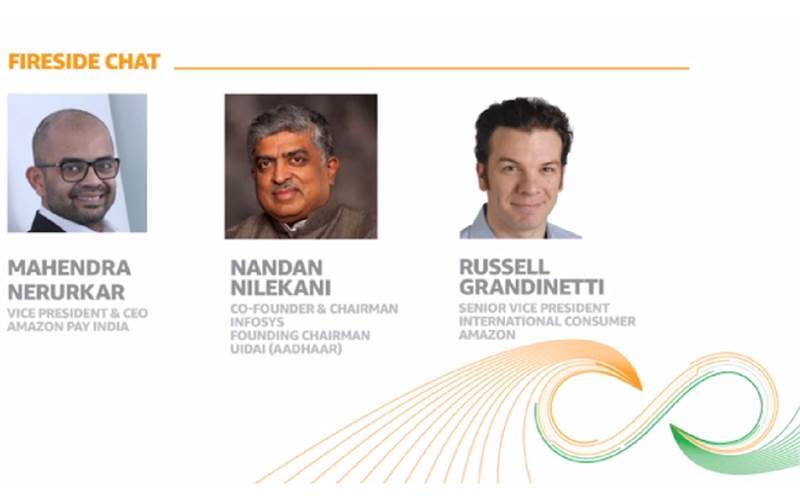Amazon Smbhav: Small business can grow – Nandan Nilekani and Russel Grandinetti discuss the nitty-gritty
In the first of the fireside chat on the third day of Amazon Smbhav, Nandan Nilekani co-founder Infosys and founding chairman, UIDAI (Aadhaar) in conversation with Russel Grandinetti, senior vice president, international consumer, Amazon, reminisced of the time when Infosys, established in 1981 was still a small company until 1991. The session was themed 'Innovating for a Better India'.
19 Apr 2021 | By Noel D'Cunha
“India’s economic liberalisation kicked in, we suddenly realised that we were going to face the gale of competition with large companies and the war for talent would carry on even more. That’s when we put in place things like strategic planning, budgeting, training facilities. All that helped us to grow very quickly after that.”
Likewise, India's small businesses can aspire to become large provided they put in the right processes and mechanisms that allow it to grow. “Small businesses are the future of India, because India has literally millions of small businesses. The GST system alone has about 11-12 million businesses registered. I strongly believe that they are the engines of economic growth and job creation,” Nilekani added.
Grandinetti shared two secret sauces for Amazon, which has helped it become the company it is.
One, it could invent in a manner that allowed us to offer a better service. “It’s what customers get when they come to our door versus the other choices and we are obsessed about it,” he said. Second, in the early days, Amazon ordered, inventoried and shipped everything that it sold. “A year later, we had the smart idea of letting other sellers also list on our store. Since then, the percentage of all the items of sellers other than Amazon, has grown and it is about 60% units we sell around the world. So, making the decision to allow other sellers to come and succeed on the marketplace that we created was very powerful and obviously, that's why we're here today,” explained Grandinetti.
At Amazon, constraint, speed, innovation are the buzzword. In the past months of COVID, Amazon had to think out of the box in order to help it serve its customers and its sellers better. “The first thought was: how to keep our people safe. Amazon has a workforce of about a million-plus people around the world. Changing how it did business physically for a business whose entire existence depended on physical delivery, had to happen quickly. So we made between 100 and 150 fundamental process changes in the flow of goods – from the time we received it to it ending up on the customer’s doorstep,” said Grandinetti.
In India, in particular, dramatic shutdowns lead to online becoming the lifeline even for a business that had been entirely offline before. Amazon sprang up a new programme, called – local shops. “We designed it just to help offline retailers build an online presence for their business. We've brought about 50,000 businesses online so far and our goal over the next five years is to make that number a million,” explained Grandinetti.
Finally, just for Indian customers paying became difficult, even just the act of paying. And so, with Amazon Pay, the company created pay later which gave eligible customers, instant access to credit so they could pay later. “So these were big changes for us around the world, and big changes for us in India,” said Grandinetti.

Covid-19 has been a big disruption around the world. What should small businesses expect in the months and years to come, that they should feel optimistic about? Nilekani said, small businesses are being brought into the ambit of the digital world – letting them have access to markets so that they can start leveraging their own data for the future. “Data and digitisation are going to play a big role and the enabling technology that will emerge is going to be the future forward.”
According to Nilekani what Amazon is doing in India is very important, and is of the opinion that it should take its initiative further in terms of enabling more jobs because that is the future. “For example, if you have 5-million suppliers on your marketplace, and each of them creates five jobs thanks to the market expansion and their offerings, then collectively they have the potential to create 25-million jobs. That's the point Amazon has to emphasise, because what India needs most now is job creators, and Amazon has a chance to create jobs at scale.”
Accepting the challenge, Grandinetti, in an optimistic tone, said, “The fundamental building block of job creation is letting the buyer meet the seller and getting things out of the way. And that, that is what our business is about in so many respects. If we (Amazon) do our jobs right, those additional jobs will come.”
The session was hosted by Mahendra Nerurkar, vice president and CEO of Amazon Pay India.












 See All
See All